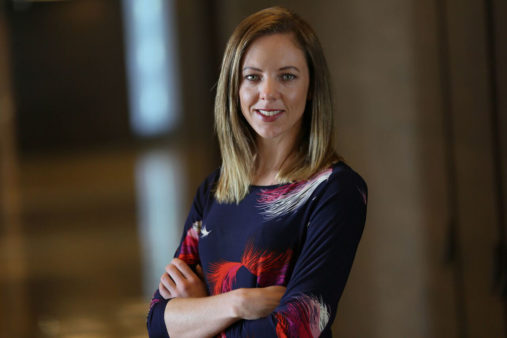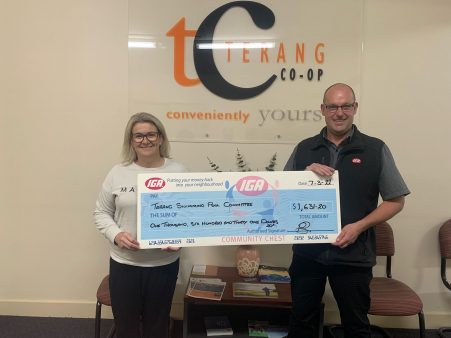The secret behind The Casino Food Co-op’s success: The power of community
Putting people before profits
A major organisation in the Northern Rivers region of NSW, The Casino Food Co-operative has been operating in various forms since 1933. Like many other co-ops, it formed as a response to a market failure. Today, The Casino Food Co-op has evolved into the largest farmer-owned meat processing co-op in Australia and is a major player in its industry, standing shoulder to shoulder with investor-owned businesses. CEO Simon Stahl credits the success of the co-op to a long history of good management, buoyed by a high level of engagement from the local community. He also notes “the business model is a little bit different” in that producers are not under exclusive contracts with the co-op and are instead free to choose how much of their beef is processed by The Casino Food Co-op.

The co-op is managed by an elected board of directors, with seven of the eight required to be co-op members (the remaining position is held by an independent director). This means that member engagement is in the DNA of the co-op. Simon also explains that having members on the board means that the organisation has deep community connections, and consequently it is regarded as approachable and supportive of the people in its local area. Of course, with so many members, the co-op is not free from disagreement. But healthy debate is encouraged instead of stifled, and members can speak directly to the directors when they have concerns, confident they will be heard.
For many years the co-op was known as the Northern Co-operative Meat Company, but a recent rebrand saw its name changed to better reflect the area it comes from – a decision that the members quickly got on board with. As it happens, the Northern Rivers is a region where co-operatives thrive, and The Casino Food Co-op works closely with local dairy co-operative Norco, member-owned bank Summerland Credit Union, as well as other established and emerging co-operatives in the region. Simon notes the renewed interest in the co-op model, explaining that “people are just looking at what's going on in the world and saying is there better models, is there better ways to do this? I think we see some corporate failures and through lack of governance, maybe lack of not morality, but maybe lack of a commitment to community. And I think people are saying, well, what other business models are out there that we can support?”.
Giving back to the local farming community is an important part of the co-op’s mission. They do this through two initiatives. The Soil Club is designed to equip farmers with the knowledge, skills and support to improve the quality of their soils and in particular to help maintain the health of the Richmond River and contribute to carbon sequestration. The River Crystal is a similar initiative that is about maintaining the clarity of the river by managing the access cattle have to the water. Through this project, 2,000 trees were also planted in a koala habitat corridor in conjunction with the World Wildlife Fund and other agencies. It’s a chance for the co-op to give back and to support the longevity of the farmland.
The recent floods in the Northern Rivers region presented both challenges and opportunities for The Casino Food Co-op. Although the co-op did not sustain direct damage from the floodwaters, there were many members of its community among the thousands who lost homes and businesses. In the months since, valued workers have been forced to leave the area in search of housing. For those who have remained, the recovery efforts have required exhausting and heartbreaking work; after so much trauma, the region is still deeply hurting.
Amazingly, there is so much resilience in the community, and the pride he has for his people and organisation is evident in Simon’s voice when he discusses the opportunities that emerged from such a terrible situation. In line with their co-operative values of putting people first, these weren’t opportunities to make money – during the crisis, that was the last thing on Simon’s mind. Instead, the co-op’s board and members seized the opportunity to take care of their community.
Some incredible stories have emerged from the floods, and The Casino Food Co-op’s people were part of these. There was the speedy transformation of the co-op’s carpark into a helipad, ready to assist with rescues and food drops, and the repurposing of their cold stores and plant facilities to store and distribute emergency food supplies. Simon explains it was a team effort, with many employees showing up to help: “They came in to volunteer their time at our cold store putting food packs together because they know they were saving their community or providing a service for the community. So they actually felt very proud of what they could do and they felt distracted from the immediate dangers and such great loss.”


Even behind the scenes people from the co-op were working quietly to look after traumatised people through the co-op’s in-house counselling program, or by assisting with accommodation and even baby formula. The strength of the co-operative model shone through during this time; it was the co-op’s local knowledge, networks and agility that positioned them to step into a leadership role at a point when emergency services and governmental organisations were hindered by red tape or hierarchy of command. While some organisations may not have the freedom to down tools and help in an emergency, it was their concern for community that made it an easy choice for the co-op to put people before profits. As Simon explains, “we did not need any approvals other than a call to the chairman. Yes, it was going to cost us some money. Yes, we might be reimbursed. But that wasn't the consideration. It was about acting and doing.”
It's not just in times of floods that The Casino Food Co-op looks at how it can help its people and community. The counselling service is one of the co-op’s most unique initiatives, having emerged from an unmet need in the community. After realising the difficulties that employees were having in accessing community-based psychological care, a pioneering HR team member retrained as a counsellor, beginning the in-house counselling program. It was this kind of foresight that meant The Casino Food Co-op was in a position to help the community when the floods came. Currently, Simon is working with his team to address some of the housing shortage that hindered the region even before the floods. The situation is now even more dire with so many homes uninhabitable. However, the co-op has just opened what Simon believes is the first meatworks onsite accommodation in Australia, with 60 beds providing solutions for their employees.
Despite the challenges The Casino Food Co-op has faced in recent years, its long history of resilience and recovery bodes well for the future. As Simon points out, “we've had a couple of hits there over the last few years, but jeez, we're tougher than that”. Although recent geopolitical shifts have proved challenging on the export front, the co-op is actively seeking new international markets and is planning to capitalise on the emerging opportunity to trade with Britain in the aftermath of Brexit.
Simon believes that the co-operative model offers a strong competitive advantage and notes that the work of the BCCM has been instrumental in advocating for this under-utilised model. “There's been a lot of work, particularly by Melina, to expose our sector to the people and the legislators”. He notes that increased visibility of co-operatives and mutuals is important to ensure the sector flourishes into the future, but that this has, at times, been hampered by a sense of humility and pragmatism that means co-ops aren’t always very good at telling their stories. However, he is positive about the future of co-operatives, recalling that he is experiencing interest in the model from farmers beyond his region.
The directors understand that consumers are increasingly aware of sustainability concerns when it comes to food production. Noting that Australia is already ahead of much of the world when it comes to our farming practices, Simon explains that there are exciting opportunities to strengthen the work Australian farmers are already doing in this space. After all, the vast majority of farmers are also passionate about good stewardship of the land and maintaining the wellbeing of their herds.
The Casino Food Co-op is constantly looking at new opportunities to support the community and help Australian farming businesses to remain strong, and Simon is a big believer in collective thriving. He knows that his role is to empower his people to do what they do best: look after one another. “They've got the energy and if they're proud … really proud of who they are and part of their community, well, then I've come a long way to supporting the company and doing my job.”
And as to the age-old question of how to barbecue a steak the right way? It’s easy, according to Simon: “one hit, turn it over, the other hit and then turn off the hot plate and let it sit”. Sounds perfect to us.
Listen to our interview with Simon Stalh on our Meet the Co-op Farmers podcast.
Visit The Casino Food Co-op website

John Seccombe, Chair by Paul Harris
Keep reading more stories

Kate Hage: Bridging the gap

Stephen Shepherd: Empowering co-operatives

